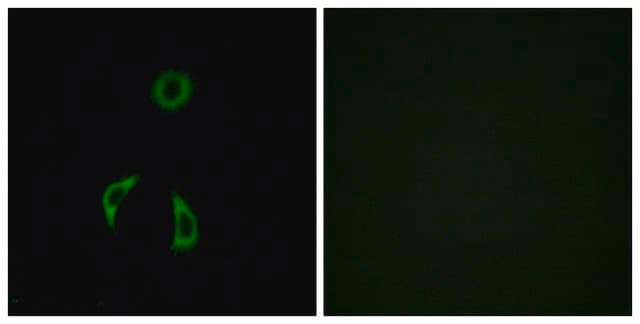07-1520
Anti-phospho-Grb10 (Ser501/Ser503) Antibody
from rabbit, purified by affinity chromatography
Synonyme(s) :
growth factor receptor-bound protein 10, OTTHUMP00000197988, OTTHUMP00000197989, OTTHUMP00000197990, OTTHUMP00000197991, OTTHUMP00000197992, OTTHUMP00000197993, OTTHUMP00000197994, GRB10 adapter protein, GRB10 adaptor protein, maternally expressed gene 1
About This Item
Produits recommandés
Source biologique
rabbit
Niveau de qualité
Forme d'anticorps
affinity isolated antibody
Type de produit anticorps
primary antibodies
Clone
polyclonal
Produit purifié par
affinity chromatography
Espèces réactives
mouse, horse, pig
Réactivité de l'espèce (prédite par homologie)
rhesus macaque (based on 100% sequence homology), equine (based on 100% sequence homology), primate (based on 100% sequence homology), porcine (based on 100% sequence homology), human (based on 100% sequence homology)
Technique(s)
western blot: suitable
Numéro d'accès NCBI
Numéro d'accès UniProt
Conditions d'expédition
wet ice
Modification post-traductionnelle de la cible
phosphorylation (pSer501/pSer503)
Informations sur le gène
human ... GRB10(2887)
Description générale
Spécificité
Immunogène
Application
Metabolism
Glucose/Glycogen Metabolism
Qualité
Western Blot Analysis: 1 µg/mL of this antibody detected Grb10 in 10 µg of insulin untreated and treated mouse embryonic fibroblast cell lysates.
Description de la cible
Forme physique
Stockage et stabilité
Remarque sur l'analyse
Insulin untreated and treated mouse embryonic fibroblast cell lysates
Autres remarques
Clause de non-responsabilité
Vous ne trouvez pas le bon produit ?
Essayez notre Outil de sélection de produits.
Code de la classe de stockage
12 - Non Combustible Liquids
Classe de danger pour l'eau (WGK)
WGK 1
Point d'éclair (°F)
Not applicable
Point d'éclair (°C)
Not applicable
Certificats d'analyse (COA)
Recherchez un Certificats d'analyse (COA) en saisissant le numéro de lot du produit. Les numéros de lot figurent sur l'étiquette du produit après les mots "Lot" ou "Batch".
Déjà en possession de ce produit ?
Retrouvez la documentation relative aux produits que vous avez récemment achetés dans la Bibliothèque de documents.
Notre équipe de scientifiques dispose d'une expérience dans tous les secteurs de la recherche, notamment en sciences de la vie, science des matériaux, synthèse chimique, chromatographie, analyse et dans de nombreux autres domaines..
Contacter notre Service technique








